This year ALMS hosted a webinar series to learn from experts from across North America on various lake related topics!
This series showcased presentations every Friday morning from September 10-October 1. See below for the webinar recordings:
Friday, September 10:
Presentation: Combining Citizen Science Data with Satellite Data To Monitor Changes In Lake Volume
When: 10:00 MDT, Friday September 10
Who: Grant Parkins. University of North Carolina.
Bio: Grant Parkins is the watershed education coordinator in the UNC Institute for the Environment’s Center for Public Engagement with Science (CPES). In this role, he engages community-based organizations, environmental science professionals, and middle and high school students and teachers in water-related educational activities. He also works coordinates with local partners and citizen scientists on the NASA-funded Lake Observations by Citizen Scientists and Satellites project (LOCSS). Grant has a Master of Science degree in Marine Science, and has more than 15 years professional experience working in science communication, education, and outreach.
Presentation: The Impact of Road Salts on our Freshwaters
When: 11:00 MDT, Friday September 10
Who: Dr. Hilary Dugan. University of Wisconsin.
Bio: Dr. Hilary Dugan is an assistant professor at the Center for Limnology at the University of Wisconsin-Madison. As a limnologist, Hilary studies how terrestrial and atmospheric changes, such as warming air temperatures or land use patterns, alter biogeochemical fluxes and aquatic processes in lakes. Her research balances field-based programs, which rely heavily on sensor networks, with the use and development of analytical models, and the application of geophysical and geospatial tools. Her research focus is on temperate and polar lakes, with sites spanning from Wisconsin to Antarctica.
Friday, September 17
Presentation: Control of Internal Phosphorus Loading in Lakes
When: 10:00 MDT, Friday September 17
Who: Dr. Ken Wagner. PhD. CLM. Water Resource Services. Massachusetts, USA.
Bio: Dr. Wagner has been involved in lake management for 45 years and has run Water Resource Services in Massachusetts for the last decade. He is a former President of NALMS and former Editor of Lake and Reservoir Management. He has been increasingly involved in internal P load control projects over the last 20 years.
Presentation: Applications of Environmental DNA (eDNA)
When: 11:00 MDT, Friday September 17
Who: Patrick Hanington: Patrick is an associate professor in the School of Public Health at the University of Alberta. He and his research group have worked on developing and implementing DNA-based tests for all manner of organisms found in aquatic environments. Patrick will present a high-level overview of eDNA. Following his brief presentation, three members of his research group will present specific stories that highlight eDNA-focused projects that are ongoing in his lab, including:
–Using Molecular Techniques to Identify Swimmer’s Itch-causing Parasites in Water. Presenter: Brooke McPhail – Brooke completed her Bachelor of Science Honours at Cape Breton University in Sydney, Nova Scotia in 208. In the same year, she started an MSc in the School of Public Health at the University of Alberta under the supervision of Dr. Patrick Hanington. Brooke then transferred to the PhD program in March of 2020. Her research focuses on using flatworm parasites as indicators for host biodiversity in Alberta reclaimed wetlands
–eDNA Monitoring of End-Pit Lakes in the Athabasca Oil Sands Region. Presenter: Dr. Elisabeth Richardson – Beth is a postdoctoral researcher in the School of Public Health at the University of Alberta, focusing on eDNA monitoring of microbial communities in reclamation sites of the Athabasca Oil Sands Region. She obtained her undergraduate and master’s degrees in biochemistry at the University of Cambridge, before moving to Edmonton to begin her doctoral research into the microbial ecology of oil sands at the University of Alberta.
–Detection of the invasive Chinese Mystery Snail in lake McGregor, Alberta using Environmental DNA (eDNA). Presenter: Dr. Abdullah Gharamah – Abdullah is a postdoctoral researcher in the School of Public health at the University of Alberta. Abdullah completed his PhD in Malaysia in 2012, with a focus on microbiology and parasitology. He began working at the U of A with Patrick in 2018, leaving a research position in his home country of Yemen.
Friday, September 24
Presentation: Prevention is Alberta’s Best Defense: AIS Lessons Learned from Manitoba
When: 10:00 MDT, Friday September 24
Who: Candace Parks. Government of Manitoba.
Bio: Candace Parks has been the Manitoba government’s Aquatic Invasive Species (AIS) Specialist for the past 12 years. She is responsible for the AIS communications, public engagement, and adaption/management programs. She also played an integral role in the development of Manitoba’s AIS laws. She lives in Winnipeg with her husband and three young boys.
Presentation: Monitoring Alberta’s Lakes: Citizen Science from Boats, Beaches, and Satellites.
When: 11:00 MDT, Friday September 24
Who: Caleb Sinn. Alberta Lake Management Society.
Bio: Caleb’s passion for freshwater ecology developed after spending many summers throughout his childhood at Gull Lake, exploring Alberta’s mountain national parks, and fishing in southern British Columbia. He graduated from the University of Alberta in 2019 with a B.Sc. double-major in Biology and Chemistry, and focused his studies specifically on community and freshwater ecology, environmental chemistry, and analytical chemistry. He also spent two years working on freshwater ecology projects ranging from mountain lake sampling to cyanobacteria monitoring and algal pigment analysis at the University of Alberta. Caleb will be presenting on ALMS’ 2020 season and plans for the future.
Friday, October 1:
Presentation: Internal Phosphorus Loading: Where It Is and What It Does to Cyanobacteria During Climate Change
When: 10:00 MDT, Friday October 1.
Who: Dr. Gertrud Nürnberg
Bio: Gertrud Nürnberg is head of Freshwater Research, a limnological company focusing on the restoration and modeling of eutrophic lakes and reservoirs. She founded this company in 1984, after completing her Ph.D. in biology/limnology at McGill University in Montreal, Canada. She’s worked with lake associations, governmental agencies, NGOs, engineering companies and the private sector in the US, Canada, and Europe. She has about 60 peer-reviewed papers on comparative research, empirical lake models on phosphorus, iron and anoxia, and on lake management techniques in numerous scientific journals. She has been involved with the North American Lake Management Society (NALMS.org) in various positions where she presented the Internal Phosphorus Workshop since 2003. She is winner of several awards (Secchi, Technical Excellence, Best paper) in recognition of outstanding research and publications in lake restoration. You can reach Gertrud at: gkn@fwr.ca and can find more information at the website: www.fwr.ca.
Presentation: Satellite Algal Bloom Monitoring in Pigeon Lake.
When: 11:00 MDT, Friday October 1.
NOTE: The original speaker has had to cancel their presentation, so instead this topic will be presented by the ALMS team.


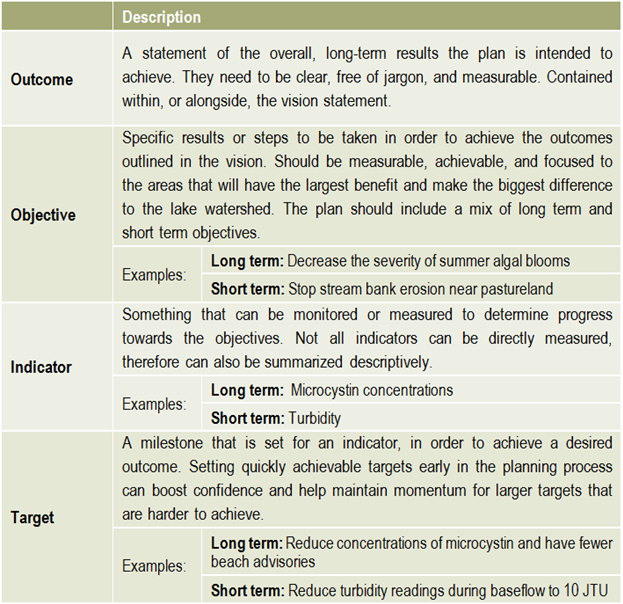
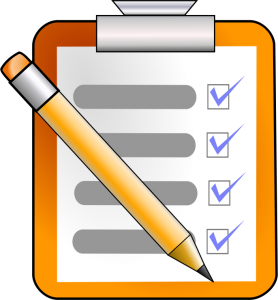 The members of the steering committee will continue to play a strong role in facilitating and tracking implementation actions. This includes any actions they were responsible for, as well as tracking other committees and sector’s actions and progress made towards achieving the plan’s outcomes. Ongoing communication is essential to successful implementation and achieving outcomes, therefore a regular reporting mechanism could be set up in order to provide regular evaluation of the plan.
The members of the steering committee will continue to play a strong role in facilitating and tracking implementation actions. This includes any actions they were responsible for, as well as tracking other committees and sector’s actions and progress made towards achieving the plan’s outcomes. Ongoing communication is essential to successful implementation and achieving outcomes, therefore a regular reporting mechanism could be set up in order to provide regular evaluation of the plan.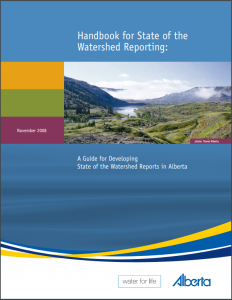
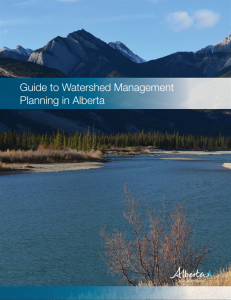
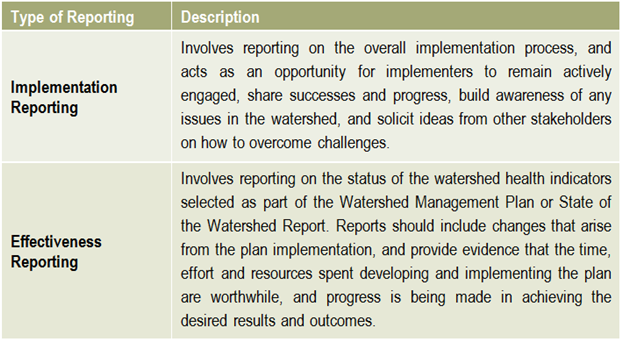 Reporting is an essential component of any watershed management planning and implementation process. There are two main types of reporting that should be shared with stakeholders on a regular basis: implementation reporting & effectiveness reporting.
Reporting is an essential component of any watershed management planning and implementation process. There are two main types of reporting that should be shared with stakeholders on a regular basis: implementation reporting & effectiveness reporting.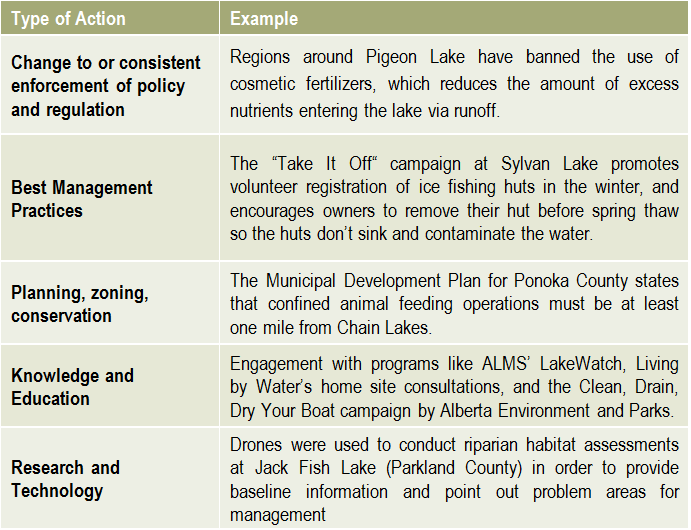 There is no limit to the number or types of lake management actions, but they typically fall into the categories on the right.
There is no limit to the number or types of lake management actions, but they typically fall into the categories on the right.
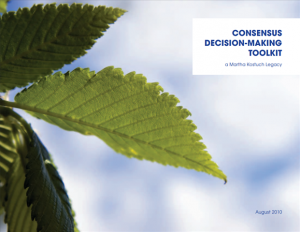
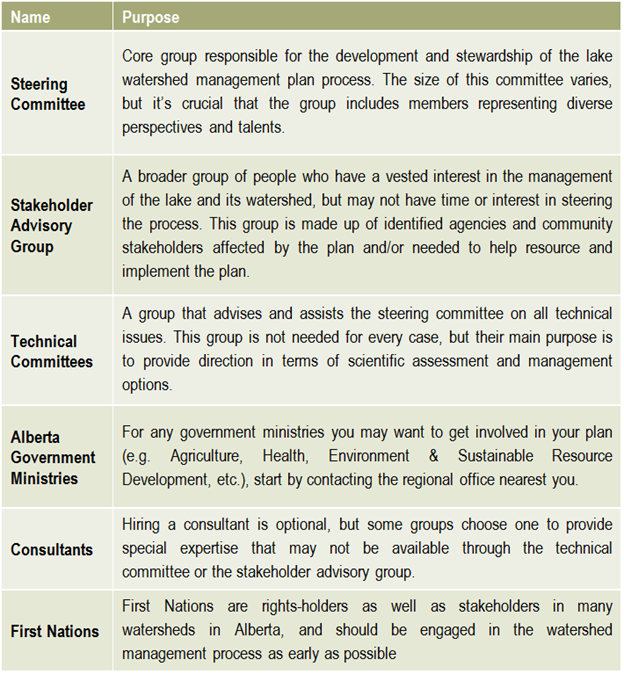 Helpful resources
Helpful resources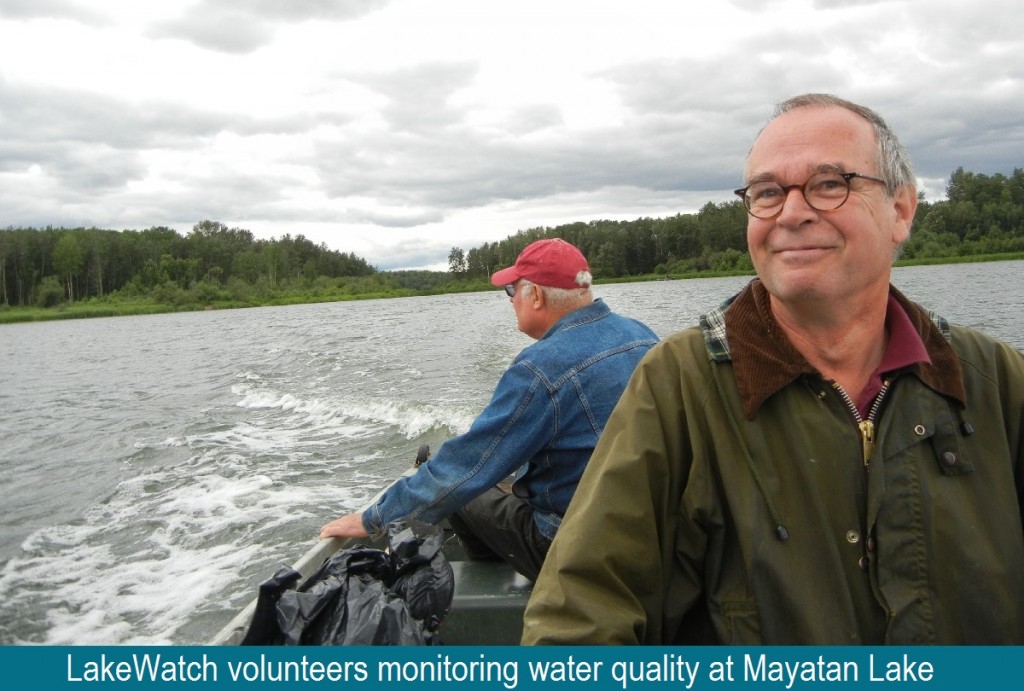 The development of a lake watershed management plan provides the guidance needed to implement activities, but the plan cannot be static. Monitoring the performance of your management actions is essential to understanding whether your goals have been met, and whether further actions are needed. Monitoring and evaluating the implementation and effectiveness of a lake watershed management plan allows assessment of progress towards the goals and objectives of the plan, identification of problems and opportunities, and a collection of critical information required when performing a 5 or 10 year review of the plan.
The development of a lake watershed management plan provides the guidance needed to implement activities, but the plan cannot be static. Monitoring the performance of your management actions is essential to understanding whether your goals have been met, and whether further actions are needed. Monitoring and evaluating the implementation and effectiveness of a lake watershed management plan allows assessment of progress towards the goals and objectives of the plan, identification of problems and opportunities, and a collection of critical information required when performing a 5 or 10 year review of the plan.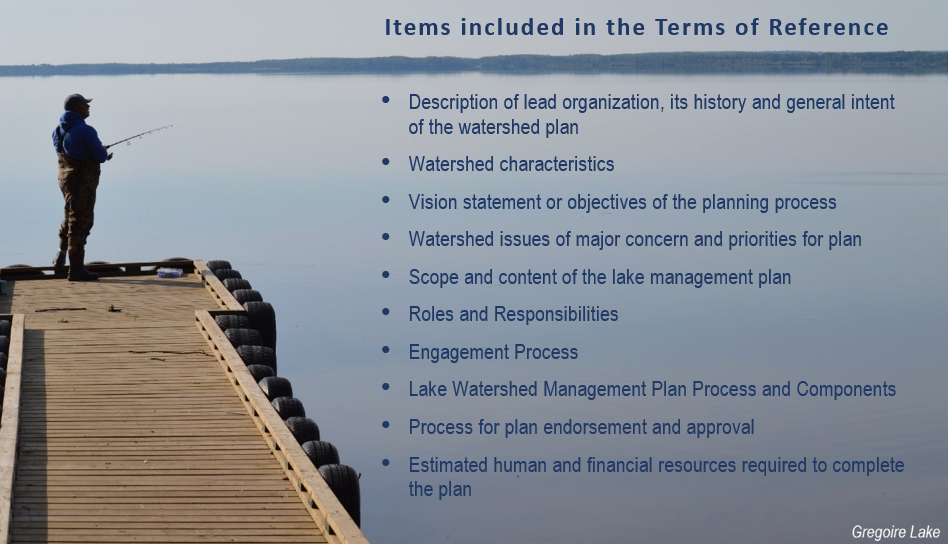
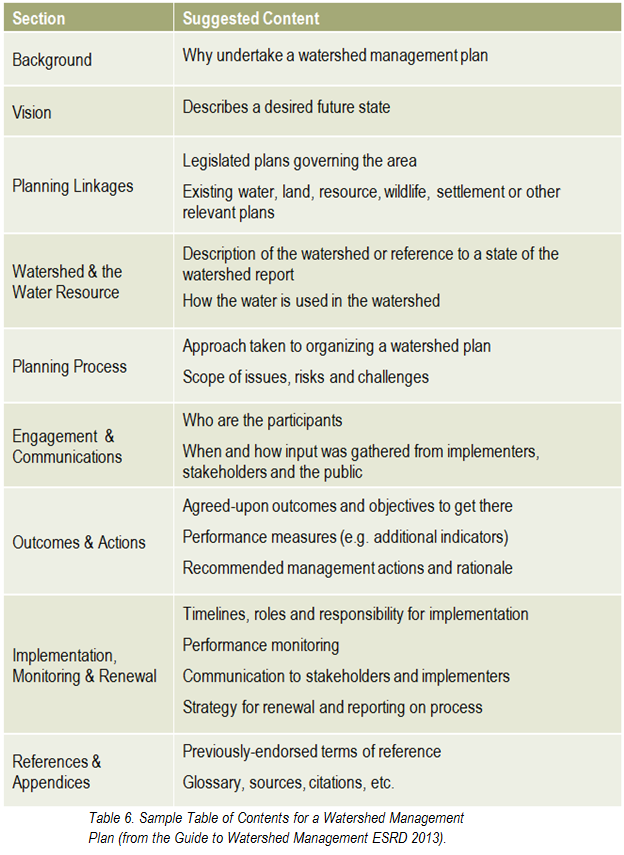
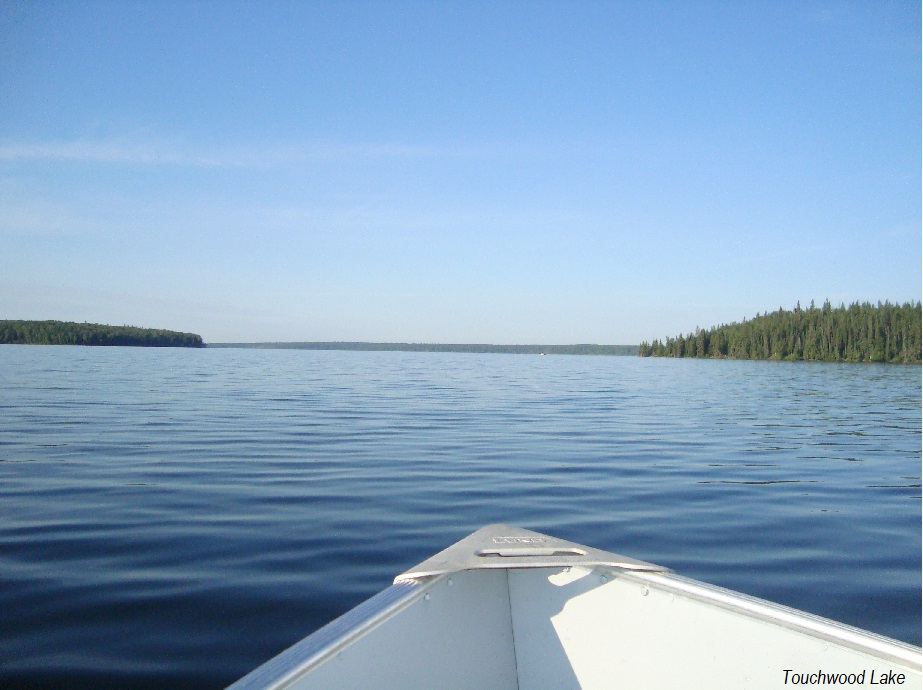 What has the monitoring results of the plan and of the indicators shown? Is there a need to modify the plan? It is important that the lake watershed management plan does not just sit on a shelf. Information gaps should be addressed, action items need to be managed, completed, and evaluated to best address the needs of the lake. Always keep in mind the vision: if the actions taken are not bringing the lake closer to that vision, then the plan needs to be modified. Consider updating both the state of the watershed and the lake watershed management plans at regular intervals to make sure that the actions taken were achieving the desired outcomes and to evaluate what work still needs to be done.
What has the monitoring results of the plan and of the indicators shown? Is there a need to modify the plan? It is important that the lake watershed management plan does not just sit on a shelf. Information gaps should be addressed, action items need to be managed, completed, and evaluated to best address the needs of the lake. Always keep in mind the vision: if the actions taken are not bringing the lake closer to that vision, then the plan needs to be modified. Consider updating both the state of the watershed and the lake watershed management plans at regular intervals to make sure that the actions taken were achieving the desired outcomes and to evaluate what work still needs to be done.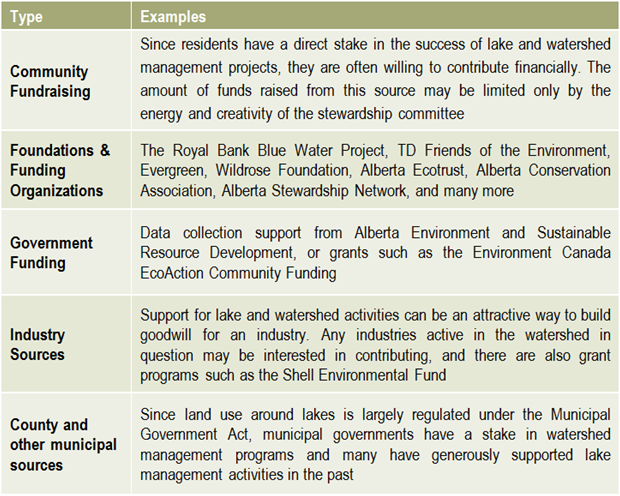 Once a plan has been approved by all affected sectors and officially endorsed and released by the steering committee, then implementation can begin in full. Action projects can be large and comprehensive, or made smaller by staging projects over time or into modules that can be tackled one at a time. Fundraising is an issue that many community groups may find intimidating, but experience with programs such as the Pine Lake Restoration Program (see
Once a plan has been approved by all affected sectors and officially endorsed and released by the steering committee, then implementation can begin in full. Action projects can be large and comprehensive, or made smaller by staging projects over time or into modules that can be tackled one at a time. Fundraising is an issue that many community groups may find intimidating, but experience with programs such as the Pine Lake Restoration Program (see 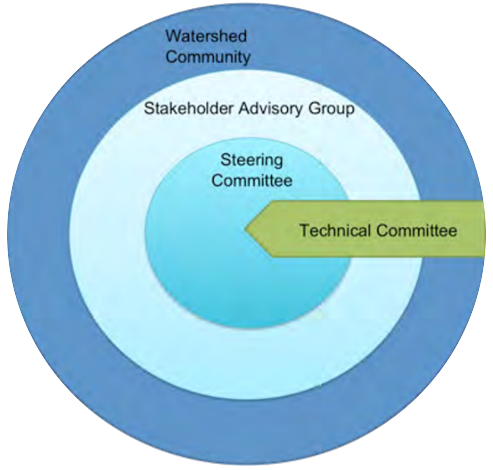 This graphic describes how the various committees and groups will work and interact together. The circle size depicts the approximate number of people involved, and the circles overlapping indicates that some individuals may reside in all of the circles and participate in multiple committees as part of the planning process. The technical committee is shown as an arrow, indicating that it is independent and has relatively few people, and yet it interacts with all of the groups. This graphic may look different depending on the lake and the people involved, and a detailed structure should be agreed upon and described in the plan’s Terms of Reference (Step 6).
This graphic describes how the various committees and groups will work and interact together. The circle size depicts the approximate number of people involved, and the circles overlapping indicates that some individuals may reside in all of the circles and participate in multiple committees as part of the planning process. The technical committee is shown as an arrow, indicating that it is independent and has relatively few people, and yet it interacts with all of the groups. This graphic may look different depending on the lake and the people involved, and a detailed structure should be agreed upon and described in the plan’s Terms of Reference (Step 6).